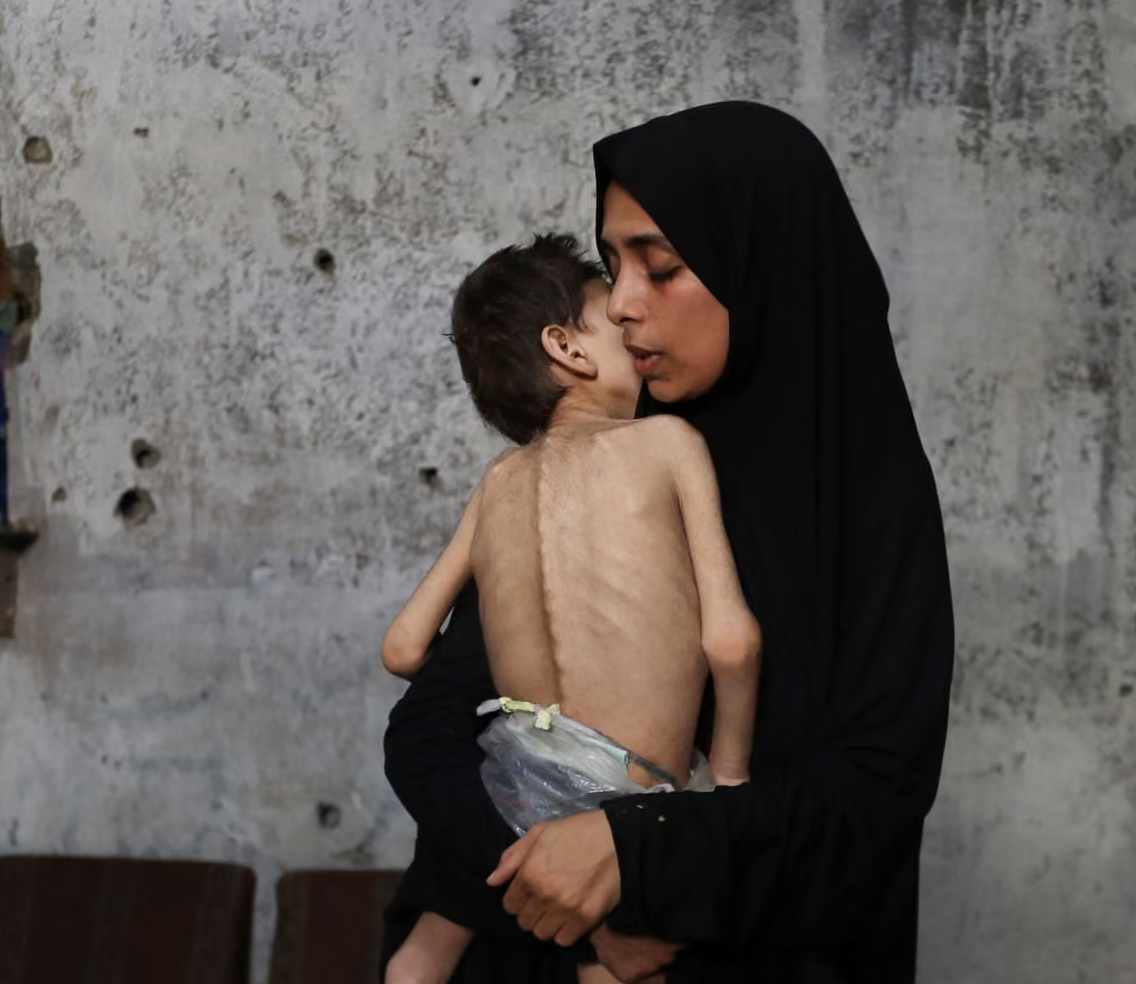
Parents observe children, as deliberate restrictions on Israel’s help make hunger a killer, while experts confirm that hunger is currently happening
The people of Gaza did not need this week’s official confirmation, made by hunger experts supported by the UN, that the “worst hunger scenario” was unfolding there. For months, they watched their children will be.
“All my children have lost almost half body weight,” said Jamil Mughari, 38, from Maghazi, in downtown Gaza. “My five -year -old daughter now weighs only 11 kg. My son Mohammad has become just skin and bone. All my children are like this.”
“I weighed 85 kg and now I reached 55.”
He struggled to maintain the necessary strength to find food for the family. “Sometimes, as I walk down the street, I feel dizziness and the feeling that I will faint, but I strive to stand. Sometimes I feel tremors too,” he said.
Throughout the week, Gaza hit two alarming milestones. The official number of Palestinian dead exceeded 60,000, although the actual number, including those buried by the rubble of Israeli air strikes, is probably much larger.
Human cost will probably continue to increase sharply as hunger becomes a problem, with bombs and shots as indiscriminate killers. On Tuesday, the integrated classification of the Food Security Phase (IPC), a panel of UN experts and other humanitarian organizations, who had long warned of the threat of hunger, confirmed that the line had been outdated.
“The worst hunger scenario is currently happening in the Gaza Strip,” said the IPC, asking for a ceasefire to avoid more “catastrophic human suffering.”
The 2.2 million inhabitants of Gaza have long been hungry experts, forced to look for food every day in the face of Israel’s deliberate and severe restrictions on help deliveries.
Mughari said the food was almost nonexistent: “We can spend a week or two without flour. Sometimes we only do one meal a day, which are lentils, and sometimes we find nothing to eat – we spend the day drinking water just to feel satisfied.”
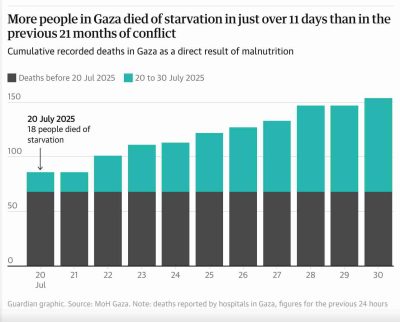
His family had to move seven times since the beginning of the war, forced to escape the repeated Israeli offensive. But there was no way to escape hunger that now plagues the entire territory.
“Sometimes we receive lentils of donations or people who do charity, or borrow money to buy them, that’s all,” he said. “We have not received food from food from community kitchens; they are only for certain camps in small quantities.”
They [israelenses] They spread news about the arrival of help, but only the strong and armeds seize trucks and sell the goods at very high prices. How can the poor buy them at these prices?
The four food distribution sites in Gaza administered by the Gaza Humanitarian Foundation are open only a few minutes a day, which attracts crowds of desperate people, who are under Israeli fire while seeking humanitarian assistance, causing many victims.
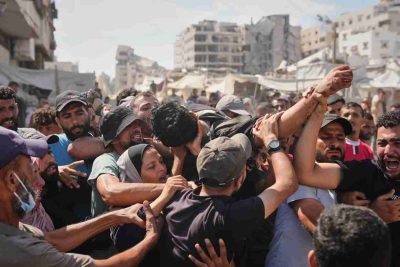 Mourning people carry the body of a dead Palestinian as they tried to reach the humanitarian aid trucks entering northern Gaza through Zikim’s passage with Israel. | Jehad Alshrafi/AP
Mourning people carry the body of a dead Palestinian as they tried to reach the humanitarian aid trucks entering northern Gaza through Zikim’s passage with Israel. | Jehad Alshrafi/AP
Mansorra Fadl Al-Helou, a 58-year-old widow, is very fragile to go to the distribution points and refuses to let his son go, afraid that he will not come back alive.
“The situation there is terrible and very dangerous. The worst is chaos among men – people pushing and throwing themselves on the floor,” she said. “Only my son is here, but I always keep him from getting close to the aid trucks because of the danger the army represents. I would not bear to see him come back to me as a martyr.”
Mughari has undergone open heart surgery and all his children are under 12 years old. Even if they wanted to risk their lives for the chance to find food, they can’t.
“I try to stay firm so I can give my children something to eat,” he said. “We send a lot of messages to the world, but no one has moved. We don’t know what to say. All I can say to the world is that we are slowly dying; save us from this tragedy.”
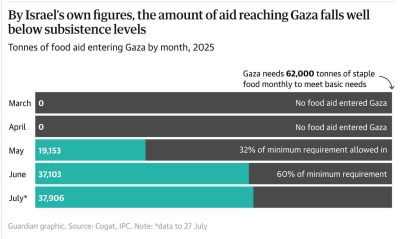
Among the horrors that the war between Israel and Gaza brought to their people, the torture of parents who see their children starving and cannot save them is certainly one of the worst.
“My youngest daughter is 14 years old and her bones of her thoracic box are quite visible due to extreme weakness and malnutrition,” said Abu Al-Abed, a father of Deir al-Balah. “I have four daughters and three children. They suffer from dizziness and fatigue because of the lack of food. If I, their father, feel that way, how worse should be for them?”
He said they received no help and that the food market was expensive and that they could only buy a little. “Prices are very high; they have not reached such high levels of inflation even in European countries. And here in Gaza, there is no source of income.”
“There were usually community kitchens in the region, but now they no longer exist. There are no more places that offer free food.
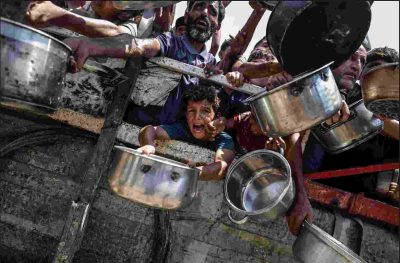 Palestinians struggle to receive meals from a charity in the city of Gaza in July. | Anadolu/Getty Images
Palestinians struggle to receive meals from a charity in the city of Gaza in July. | Anadolu/Getty Images
He said he no longer believed the world had any sense of responsibility. “For years, they boasted of human rights and life protection. What I see now is that all this was a lie, we were deceived by these slogans.”
If we had asked them to protect animal rights in Gaza, they would have responded immediately and made the impossible. But when it comes to the rights of the Palestinian people, no one remembers us or pitying us, neither the Arabs, nor the Muslims, nor the Christians, no one.
The official IPC recognition of what the people of Gaza knew very well – that they were hungry – brought a fine hope that the outside world would finally mobilize to act, although the long experience would not bring much confidence that this would happen.
Al-Helou said, “We have been suffering from this hunger for a long time, and no one has acted. I hope that through this message the world finally moves to help us and save us from this slow death.”
The news of the United Kingdom promise to recognize Palestine in September, except for a ceasefire and a fundamental change of direction by Israel, impressed it even less.
“I don’t know what would change if the British government recognized the state of Palestine. What kind of state has no sovereignty, no right to self -defense?” She asked. “It is a good step to recognize us and the state of Palestine, but it must be a real recognition – not symbolic. A state with real rights, real sovereignty and a people with rights like any other nation.”
Originally published by The Guardian on 08/02/2025
Anantest Porch Porch of
Source: https://www.ocafezinho.com/2025/08/02/estamos-morrendo-lentamente-salvem-nos-a-fome-se-instala-em-gaza-apos-uma-semana-de-marcos-terriveis/

